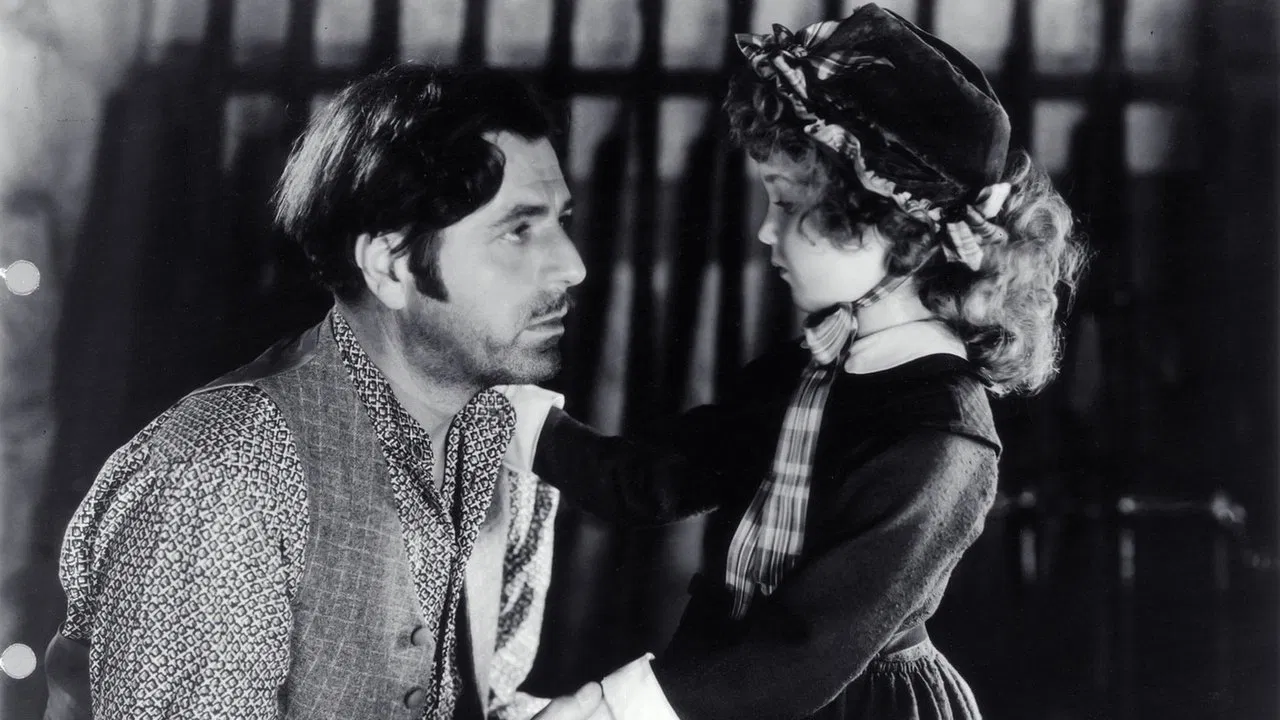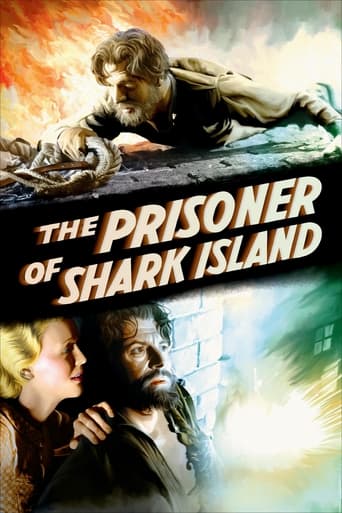

The Prisoner of Shark Island is directed by John Ford and written by Nunnally Johnson. It stars Warner Baxter, Gloria Stuart, Harry Carey, John Carradine, Ernest Whitman, Francis McDonald, Joyce Kay, Claude Gillingwater and Frank McGlynn. Music is by R.H. Bassett and Hugo Friedhofer and cinematography by Bert Glennon. After setting the broken leg of John Wilkes Booth (McDonald), Dr. Samuel A. Mudd (Baxter) is tried as a co-conspirator in the assassination of Abraham Lincoln (McGlynn). Sentenced to life imprisonment at the military prison of Fort Jefferson in the Dry Tortugas, Mudd desperately tries to stay sane and fight a vicious regime in the hope of one day proving the unjust nature of his sentence. A personal favourite of Ford's, it's not hard to see why given that The Prisoner of Shark Island is supreme film making. Based on the true story of Samuel Mudd, there is perhaps unsurprisingly some little fudging of the facts, but this in no way detracts from the truthful basis of this incredible human interest story. Time is afforded to the joy at the end of the Civil War, Lincoln's weariness (McGlynn classy as usual), the assassination on that desperate day April 14th 1865, Mudd's family life and moral fibre and then the night he abided by his Hippocratic Oath and administered medical aid to the man who had just murdered the president. These are all delicately handled scenes by Ford, who aided by Johnson's screenplay manages to hit home to us the fragile nature of the Mudd incident that is harnessed by a country grieving with anger. Once the trial arrives, the film shifts to another level, the delicacy of Ford's framing of characters and Johnson's rich dialogue passages are replaced by striking imagery and an impassioned performance by the wonderful Baxter. The hooded prisoners on trial for their lives and the wooden gallows outside the court chill the blood, then Baxter delivers his heart tugging three pronged defence monologue that is as good a piece of acting as was given in the 30s. Sentenced passed, execution off camera strikes a chord and then Mudd sits alone and forlorn in a darkened cell, filtered light shards imprison Mudd and let us know that Glennon has arrived to takes us up yet another notch. What then unfolds is a superb depiction of the horrors of prison life, Fort Jefferson is a dank and desperate place, a place of misery for the prisoners, especially for Mudd, who has the patriotic but sadistic Sergeant Rankin (Carradine brilliant) after his blood. Ford is alive to the benefits of Carradine's nasty performance, so has him lighted as malevolent and angled like a horror movie protagonist. Some of the shots during the prison sequences are clinical on impact value, such as Mudd on his cell window sill or one capture as he stares down through a floor grate, shadows and light showing Glennon at his best and giving us a shot fit to grace the best film noirs of the 40s. The rest is history as written, the desperation of an escape attempt, the yellow fever outbreak and his eventual pardon by President Andrew Johnson (this would be 1869 in reality). Nicely packaged by Ford who closes the picture down by having Mudd and Buck (Whitman an impressive presence throughout the picture), his one time black slave and loyal friend, return home to their families, harmony restored after such hardships. There is inevitably some annoyance by critics and film fans alike that the black characters are racial stereotypes, but this is a 1936 film depicting a story unfolding in 1865/67, Ford and Johnson's work here is representative of its times. And in no way, to my film loving mind, hurts this picture in any way. Classic cinema in its purest form from the writing table to finished product, it's highly recommended viewing. 9.5/10
... View MoreIn today's police jargon, Dr. Samuel A. Mudd would be referred to as a 'known associate' of presidential assassin John Wilkes Booth. What or how much he knew of Booth and his schemes is still a matter of interpretation. It is certain on that night that Booth and accomplice David Herrold came knocking at his door to mend Booth's broken leg as a result of jumping off the balcony at Ford's Theater after shooting Abraham Lincoln, Mudd had no way of knowing what had just happened.He was acquainted with Booth, it was no accident Booth stopped by that night, he knew where a doctor was. Mudd obfuscated the facts and that might just have earned him the trip to the Dry Tortugas.The Prisoner of Shark Island overlooks these details. What it does not do is overlook the complete disregard for due process. Booth, his confederates in the assassination plot against top government officials, and those like Mudd who got drawn into the orbit of Booth were tried by drumhead military tribunals as is shown. It's also to be remembered that we were five days after Lee's surrender at Appomattox. Other armies like Joe Johnston's, Richard Taylor's were still in the field. Confederate elected officials like Jefferson Davis were also at large. It was by no means an easy time for the justice system. Abraham Lincoln himself had suspended habeas corpus during the war and Dr. Mudd got caught in that order.Warner Baxter and Gloria Stuart make a fine Dr. and Mrs. Mudd. Baxter articulates well the man caught in a Kafkaesque nightmare. Also note some fine performances that John Ford elicited from Claude Gillingwater as Baxter's unreconstructed rebel father-in-law, Harry Carey, Sr. as the prison commandant, and John Carradine as the stockade sergeant who has a burning hatred for Mudd the man accused of complicity in Lincoln's death. Such was the public opinion of most in the north.The Prisoner of Shark Island also graphically illustrates Mudd's heroism in fighting the yellow fever epidemic in the Dry Tortugas prison. That part is completely factual and did win him a pardon in 1869 from outgoing President Andrew Johnson. That by the way is no accident. Johnson by that time had broken with the Radical Republicans and had escaped removal from office via impeachment by one vote in the Senate. The power to pardon however remains the sole property of the president and I'm sure that was Johnson's way of thumbing his nose at incoming President Ulysses S. Grant. There was no love lost between those two. We've recently seen an example of the abuse of the pardoning power with Bill Clinton's last days in the White House and I'm sure Scooter Libby will get a similar pardon from George W. Bush as he leaves office.Dr. Mudd however really earned his and if you watch The Prisoner of Shark Island, I'm sure you'll agree.
... View MoreThis moving story does have some actuality. One of the interesting details is some legal argument about the place of residence of doctor Mudd. The lawyers argue that if he could be transported from Shark Island, the prison on Dry Tortugas, to a place where normal US legislation is applied, then a writ of habeas corpus could be served and he would go free. Therefore Mudd's supporters launch a failed rescue attempt to that effect. On Dry Tortugas, an island off the Floridy Keys, the prisoner has no chance to appeal for territorial reasons. In my understanding (I am no lawyer, however) this pretty much reflects the Guantanamo situation of today and one just hopes that no doctor Mudds are holed up there and that all open legal questions in that context can be resolved satisfactorily.I am always amazed how outspoken movies of the great Hollywood Studios could be on political issues or social or legal injustice. This movie is an important product of this tradition. The Prisoner of Shark Island is almost an Anti Yankee-movie. The soldiers are uncouth and brutal, the carpet baggers sleazy double talkers. The authorities panic after President Lincoln's assassination. Somebody, anybody has to hang for the crime. And fast. One of the memorable moments of the movie has one of the military judges in charge say something like we owe it to the people", clearly meaning the enraged mob in the square below. Thinking of who else claimed to fulfill the wishes of the people" around 1936 this could also be an appeal to legal authorities to serve the written law and not give in to those who shout the loudest.Director John Ford certainly knew how to stir up emotions, some of the pathos might be regarded as slightly overwrought by contemporary viewers. However, The Prisoner of Shark Island certainly is one of the most beautiful and memorable movies of his.
... View MoreMovie audiences who think of director Ford as mostly a western filmmaker may enjoy checking out this solid, mid-career film set in the post-Civil War era. Based on fact (but fact that is hotly disputed by two camps), it depicts the tribulations of Dr. Samuel Mudd, a country doctor who one night, according to this film, set the broken leg of a stranger and was later sentenced to prison for it. The stranger turned out to be none other than John Wilkes Booth, fresh from assassinating President Abraham Lincoln. Baxter plays the doctor who finds himself caught up in a maelstrom of outrage and can't get a fair trial. He is sent to Dry Tortugas, a sweltering, severely-run island prison which is surrounded by a shark-filled moat. A former slave of his (Whitman) attempts to aid him in escape, but it's hardly an easy accomplishment. Meanwhile, Baxter's devoted wife Stuart examines every possible avenue of retrieving her husband and seeing him pardoned or at least retried. Baxter suffers mightily, especially from Carradine, a zealously antagonistic prison sergeant, until he has a chance to redeem himself during a horrific Yellow Fever epidemic. Baxter, an actor few people would be able to note as a Best Actor Oscar winner (for "In Old Arizona") does a commendable job and a reasonably understated one considering the period. He has to carry much of the film on his shoulders and is solid throughout. Stuart hasn't got a great deal to do, but she is strong as well and is benefited by several affectionate close-ups. (She claims to have been given virtually no direction by Ford, but comes across professionally and emotionally appropriate nonetheless.) Her Confederate father is played by Gillingwater in an interesting, but entirely over the top performance. Gillingwater's reaction to the presence of Union soldiers in his home is preposterously handled. Rounding out the family (in a detail that has no relation to the reality of the Mudd's family tree) is perky and adorable little daughter Kay (whose career, strangely, didn't go anywhere much after this.) Carradine is memorably menacing and already possesses his distinctive growl of a voice at the time of filming. Fix, who went on to a memorable career as a character actor, appears as an accomplice to Wilkes Booth (adequately played by McDonald.) Though the story of Dr. Mudd, as presented here and in some memorable television productions, is a stirring and dramatic one, there are large factions of people who believe that he was not quite the innocent lamb he is made out to be in this film. Reportedly he at least met with Wilkes Booth (possibly even plotted a kidnap attempt) and may have been part of the plan all along as he despised Lincoln. However, as Baxter even points out in this movie, a broken leg couldn't have been a planned part of any scheme! The film is best enjoyed as fiction, in the same vein as "The Count of Monte Cristo" or even the more recent "An Innocent Man", rather than a piece of history. With some nice performances, several striking visuals and a rip-snorting storm sequence, it's easy to watch and enjoy.
... View More